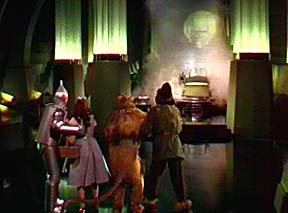 Rick: How can you close me up? On what grounds?
Rick: How can you close me up? On what grounds?
Renault: I’m shocked, shocked to find that there is gambling going on here!
Croupier: Your winnings, sir.
Renault: Oh, thank you very much
Alan Greenspan: Those of us who have looked to the self-interest of lending institutions to protect shareholder’s equity (myself especially) are in a state of shocked disbelief.
Testifying before the Committee of Government Oversight and Reform, an almost penitent Alan Greenspan was not only shocked but admitted something few deemed possible- a flaw in his free-market belief system. Perhaps if Greenspan knew a little more about a good poker game, like Marriner S. Eccles, Federal Reserve Chairman from 1934-1948, he would have been spared this public confession.
“In consequence, as in a poker game where the chips were concentrated in fewer and fewer hands, the other fellows could stay in the game only by borrowing. When their credit ran out, the game stopped.
Had the six billion dollars, for instance, that were loaned by corporations and wealthy individuals for stock-market speculation been distributed to the public as lower prices or higher wages and with less profits to the corporations and the well-to-do, it would have prevented or greatly moderated the economic collapse that began at the end of 1929.”
 I almost felt sorry for Greenspan. Congress used to be one place Greenspan could count on to get his ring kissed. He was the great and powerful Oz. But since Greenspan poo pooed everything from the housing bubble to the regulation of credit default swaps in his tenure, Congress basically bitch slapped him during his most recent visit. So I thought I’d spend a few moments looking back at the man behind the curtain.
I almost felt sorry for Greenspan. Congress used to be one place Greenspan could count on to get his ring kissed. He was the great and powerful Oz. But since Greenspan poo pooed everything from the housing bubble to the regulation of credit default swaps in his tenure, Congress basically bitch slapped him during his most recent visit. So I thought I’d spend a few moments looking back at the man behind the curtain.
At the Credit Union National Association 2004 Governmental Affairs Conference, Washington, D.C.
February 23, 2004
The Federal Reserve’s Survey of Consumer Finances suggests that these newer homeowners who make smaller down payments tend to bring with them higher levels of nonmortgage debt and, in particular, credit card debt. The ability of lending institutions to manage the risks associated with mortgages that have high loan-to-value ratios seems to have improved markedly over the past decade, and thus the movement of renters into homeownership is generally to be applauded, even if it causes our measures of debt service of homeowners to rise somewhat.
American consumers might benefit if lenders provided greater mortgage product alternatives to the traditional fixed-rate mortgage. To the degree that households are driven by fears of payment shocks but are willing to manage their own interest rate risks, the traditional fixed-rate mortgage may be an expensive method of financing a home.
 To the Federal Reserve Bank of Chicago’s Forty-first Annual Conference on Bank Structure, Chicago, Illinois
To the Federal Reserve Bank of Chicago’s Forty-first Annual Conference on Bank Structure, Chicago, Illinois
May 5, 2005
As is generally acknowledged, the development of credit derivatives has contributed to the stability of the banking system by allowing banks, especially the largest, systemically important banks, to measure and manage their credit risks more effectively. In particular, the largest banks have found single-name credit default swaps a highly attractive mechanism for reducing exposure concentrations in their loan books while allowing them to meet the needs of their largest corporate customers.
Market participants usually have strong incentives to monitor and control the risks they assume in choosing to deal with particular counterparties. In essence, prudential regulation is supplied by the market through counterparty evaluation and monitoring rather than by authorities. Such private prudential regulation can be impaired–indeed, even displaced–if some counterparties assume that government regulations obviate private prudence. We regulators are often perceived as constraining excessive risk-taking more effectively than is demonstrably possible in practice. Except where market discipline is undermined by moral hazard, for example, because of federal guarantees of private debt, private regulation generally has proved far better at constraining excessive risk-taking than has government regulation.That said, there can be little doubt that exceptionally low interest rates on ten-year Treasury notes, and hence on home mortgages, have been a major factor in the recent surge of homebuilding and home turnover, and especially in the steep climb in home prices. Although a “bubble” in home prices for the nation as a whole does not appear likely, there do appear to be, at a minimum, signs of froth in some local markets where home prices seem to have risen to unsustainable levels.
Before the Joint Economic Committee, U.S. Congress
June 9, 2005
The apparent froth in housing markets may have spilled over into mortgage markets. The dramatic increase in the prevalence of interest-only loans, as well as the introduction of other relatively exotic forms of adjustable-rate mortgages, are developments of particular concern. To be sure, these financing vehicles have their appropriate uses. But to the extent that some households may be employing these instruments to purchase a home that would otherwise be unaffordable, their use is beginning to add to the pressures in the marketplace.
Although we certainly cannot rule out home price declines, especially in some local markets, these declines, were they to occur, likely would not have substantial macroeconomic implications. Nationwide banking and widespread securitization of mortgages make it less likely that financial intermediation would be impaired than was the case in prior episodes of regional house price corrections.
There’s no place like home. There’s no place like home. There’s no place like home.

3 Comments